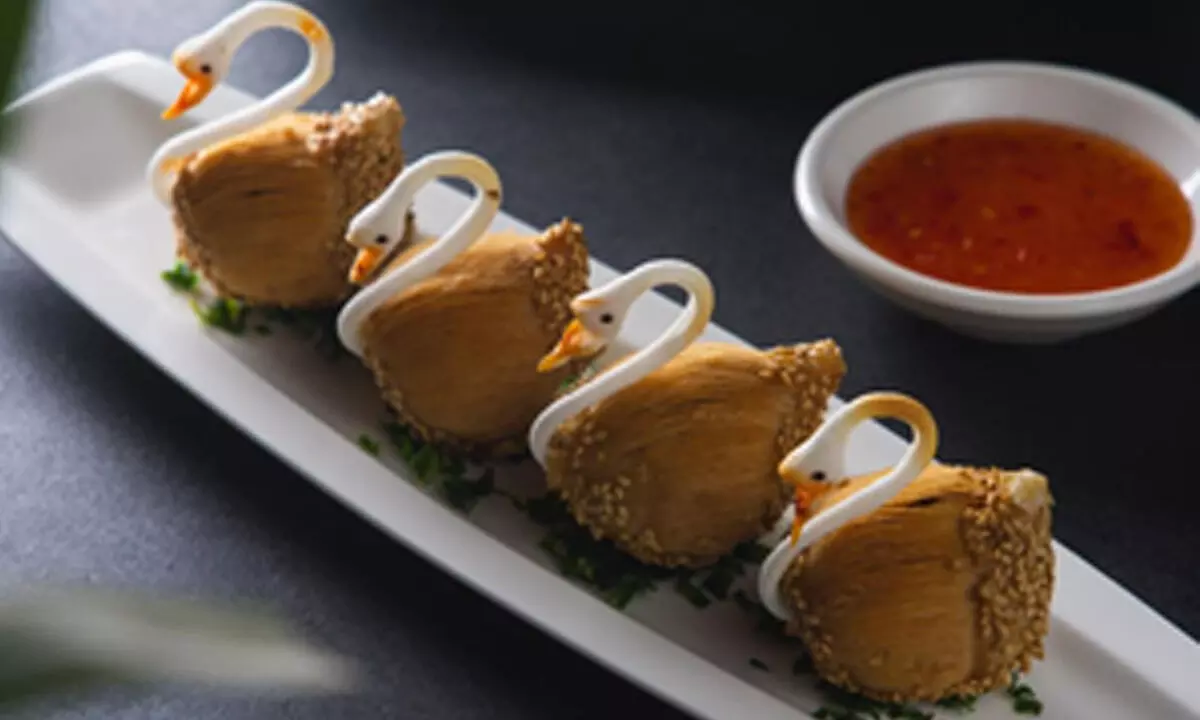Sheraton New Delhi's Yi Jing reinvents its menu without tinkering with classics
Share :

Years before swanky malls transformed the identity of Saket in the crowded southern fringe of the national capital, a restaurant named Pan Asian opened in what was then an ITC-managed hotel called the Marriott WelcomHotel.
New Delhi: Years before swanky malls transformed the identity of Saket in the crowded southern fringe of the national capital, a restaurant named Pan Asian opened in what was then an ITC-managed hotel called the Marriott Welcom Hotel.
Inspired by Singapore's iconic Mezza9 restaurant, Pan Asian, although Chinese-led, became instantly famous because of its Korean barbecue, which was then a novelty, and teppanyaki counter, and later for its live sushi corner presided over by a well-regarded Japanese master chef, Nariyoshi Nakamura.
Pan Asian was able to carve a niche for itself despite stiff internal competition from Dakshin, which, with its largely non-vegetarian, seafood-led menu, had completely changed the idli-dosa-vada view of South Indian fare that the average Dilliwallah nurtured for years.
As time passed, Pan Asian lost its mojo, and ITC, at Kohenur, its luxury hotel in Hyderabad, came up with an all-new contemporary Chinese restaurant concept inspired by Da Dong, the Beijing-based master of an avant garde re-interpretation of the ancient cuisine.
The new restaurant was called Yi Jing ('to change the classic'), centred mainly around the piquant offerings of the Sichuan and Hunan kitchens, and eventually it came to the Saket hotel, which has been known for quite some time as the Sheraton New Delhi.
The restaurant has unveiled a 2.0 version of its menu, whose main attractions are Dim Sum Chef Wang Peng's delicious pieces of edible art. The chef, incidentally, was a part of the original Yi Jing team at Kohenur and is at present visiting from his current address -- ITC Narmada, Ahmedabad. The mains, as they have been for some time, are from Chef Deepak Pujari's creative wok.
Yi Jing describes its menu as classical and creative -- and rightly so. We opened our dinner with Chicken Char Siu Dumplings shaped artfully like ducks (a pleasantly surprising change from the barbecued pork baos). The sheer beauty of the dumplings made them an elevating sensory experience, despite the rather stiff price tag.
The Cantonese-style sweet and tangy fried lotus stem and the crispy Sichuan prawns that were both 'kadak' and 'chatpata' -- two qualities that Delhiites love in the food they eat -- definitely set us in the mood for more.
As if these weren't enough to get us hooked, the crispy New Zealand lamb with dried chillies and peppers was an expression of the thought behind the new menu: it doesn't play around with the essence of Chinese cuisine, despite a presentation style you wouldn't normally expect at a Chinese restaurant.
Nor does it pass off the immensely popular Sino-Ludhianvi cuisine as Chinese 2.0.
The mains we had were high on taste, but without any drama in the presentation style. The Clay Pot Mapo Tofu did not tinker with a classic, nor did the lobster cooked in oyster sauce, which turned out to be an ode to the elegance of simplicity. Together with stir-fried jasmine rice that delicately balanced the soy and burnt garlic and wok-tossed vegetarian noodles loaded with peppers, the mains tasted doubly good.
Our meal was brought to a glorious end by a hazelnut praline chocolate rocher (that's French for 'rock') that arrived in a ball of candyfloss, which was removed by our friendly server with the help of a flaming dram of whisky. The chocolate ball was in flames as we dug into it, simultaneously spooning away the warm whisky to complete the treat.
A visit to Yi Jing may set you back financially, but you'll come back with the feeling that the evening was worth the investment. It is the kind of restaurant you'd go to for a celebratory evening or to impress a foreign client. In either case, you'll come back happier than ever.













